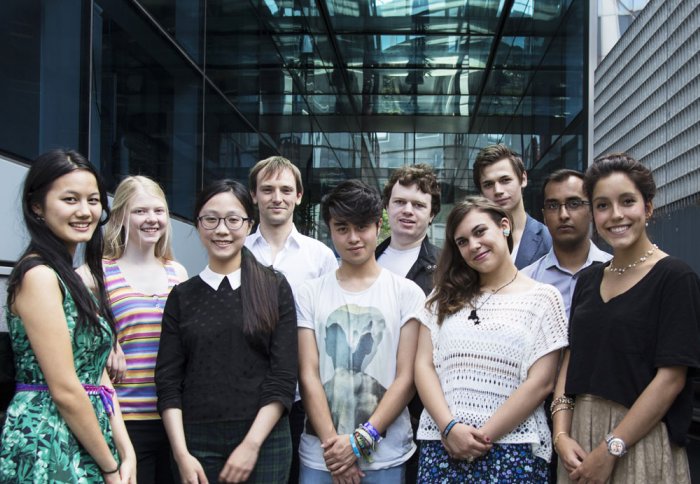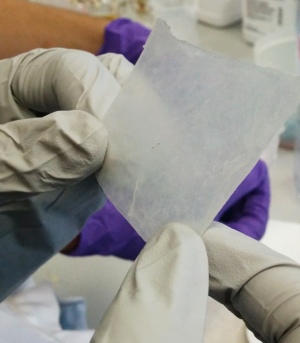Herbal brew by-product helps team win prizes in global competition
by Colin Smith

A water filter made from a by-product of herbal tea has helped a student team come second in an international synthetic biology competition.
In synthetic biology, researchers re programme cells, by changing their DNA, to develop microscopic devices that can be used to address a range of challenges such as producing low-carbon fuel and creating new pharmaceuticals.
The team of undergraduates from Imperial College London competed against 220 teams from universities around the world at the 2014 International Genetically Engineered Machine (iGEM) competition, which was held in Boston, USA. They were given a kit of biological parts including harmless bacteria and cells. Working at the College over the summer, the Imperial team undertook a project and used the parts to design and build a new type of membrane.

Bacterial cellulose membrane
Membranes are used by a range of industries to purify liquids. The team created a membrane using bacterial cellulose, a by-product of the Gluconacetobacter xylinus bacteria found in fermented kombucha herbal tea. They sequenced the entire genome of the bacteria, recoded its DNA, and inserted it into harmless E. coli, where bacterial cellulose production could be optimised.
As the membrane is made from a naturally occurring substance, it is more environmentally friendly than standard membranes, which are generally made from non-biodegradable materials such as plastic. It is also 20 times stronger than conventional membranes, which means that it can withstand high water pressures, making it more efficient at straining out toxins from water. The team estimate that it would be six times less costly to make than conventional membrane technology, which means it could cut costs in industry. It could also be customised during the manufacturing process to filter out a specific toxin or harmful trace metal, making it potentially more adaptable than current technologies.
In addition to coming second in the overall competition, the team was also awarded gold medals and they won the manufacturing category, along with the “Best collection of biological parts” section of the competition.
The team was supervised by Professor Richard Kitney, Dr Tom Ellis, Dr Guy-Bart Stan and Ben Reeve, who are all from the Department of Bioengineering, and Professor Paul Freemont, from the Department of Medicine at the College.
Professor Paul Freemont, Co-Director of the Centre for Synthetic Biology and Innovation, from the Department of Medicine, said: “With more than half of the global population facing water stress in 2025, due to the huge demand on dwindling freshwater supplies, the team focused their efforts on water purification, with outstanding results. We are so proud of Aqualose because they competed against other universities that had far greater resources at their disposal, and it’s a testament to the team’s intelligence and commitment that they did astoundingly well.”
Professor Richard Kitney, Co-Director of the Centre for Synthetic Biology and Innovation, from the Department of Bioengineering, said: “The iGEM competition is a crucible of ideas, where universities from around the world come together to create technologies that could potentially improve our lives. Filtration is an underpinning process that enables most industries and utilities to deliver the products and services that we take for granted in our daily lives. The judges must have recognised the potential for this technology and I am proud of our team’s efforts.”
Michael Florea, third year undergraduate in the Department of Life Sciences and team member, said: “We worked very hard on this project and we are really glad that it paid off in the end with such good results in the competition. It was exciting to meet other teams from all over the world and it gave us a chance to see the projects that they were working on.”
The team has already carried out tests to determine how effective the membrane is at filtering the harmful trace metal nickel, an industry by-product that can cause water contamination. Their membrane technology was able to remove more than 99.9 per cent of nickel from a concentrated nickel solution of 30000 parts per million, using less energy than conventional systems.
The team are now investigating whether they can commercialise their membrane technology.
Article text (excluding photos or graphics) © Imperial College London.
Photos and graphics subject to third party copyright used with permission or © Imperial College London.
Reporter
Colin Smith
Communications and Public Affairs